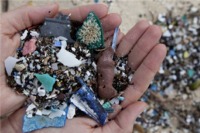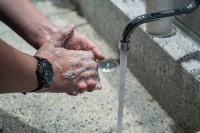
New research from the Irish EPA (Environmental Protection Agency) shows that micro-plastics are now entering Irish fresh water as well as seawater. Microplastics in the form of microbead scrubbers are present in some cosmetics and household cleaning products are starting to harm the Irish environment. The research was carried out by researchers in the Marine and Freshwater Research Centre at Galway Mayo Institute of Technology (GMIT). It provides vital national level data and information on the environmental sources and risks posed by microplastics and plastic waste in general which has the potential to become microplastic over time. Consumers can help by checking the product labels of cosmetics, clothes and cleaners to see if they certify they are microplastic free.
The principle source of microplastics identified in the report are microbeads washed into sewers or septic tanks from the use of personal care products and cleaning products. Another significant source are synthetic fibres from polyester clothing expelled into the environment in washing machine wastewater. Although some microplastics are discharged with the wastewater into receiving freshwater systems, most of the fibres become trapped in sewage sludge at treatment plants. The spreading of these sludges on agricultural land poses risks to terrestrial ecosystems and potentially further risks to freshwater systems. For households worried about potential microplastic and other micropolutants in their drinking water supplies, we recommend the installation of a quality point of use water filter or wholehouse water filtration system.
